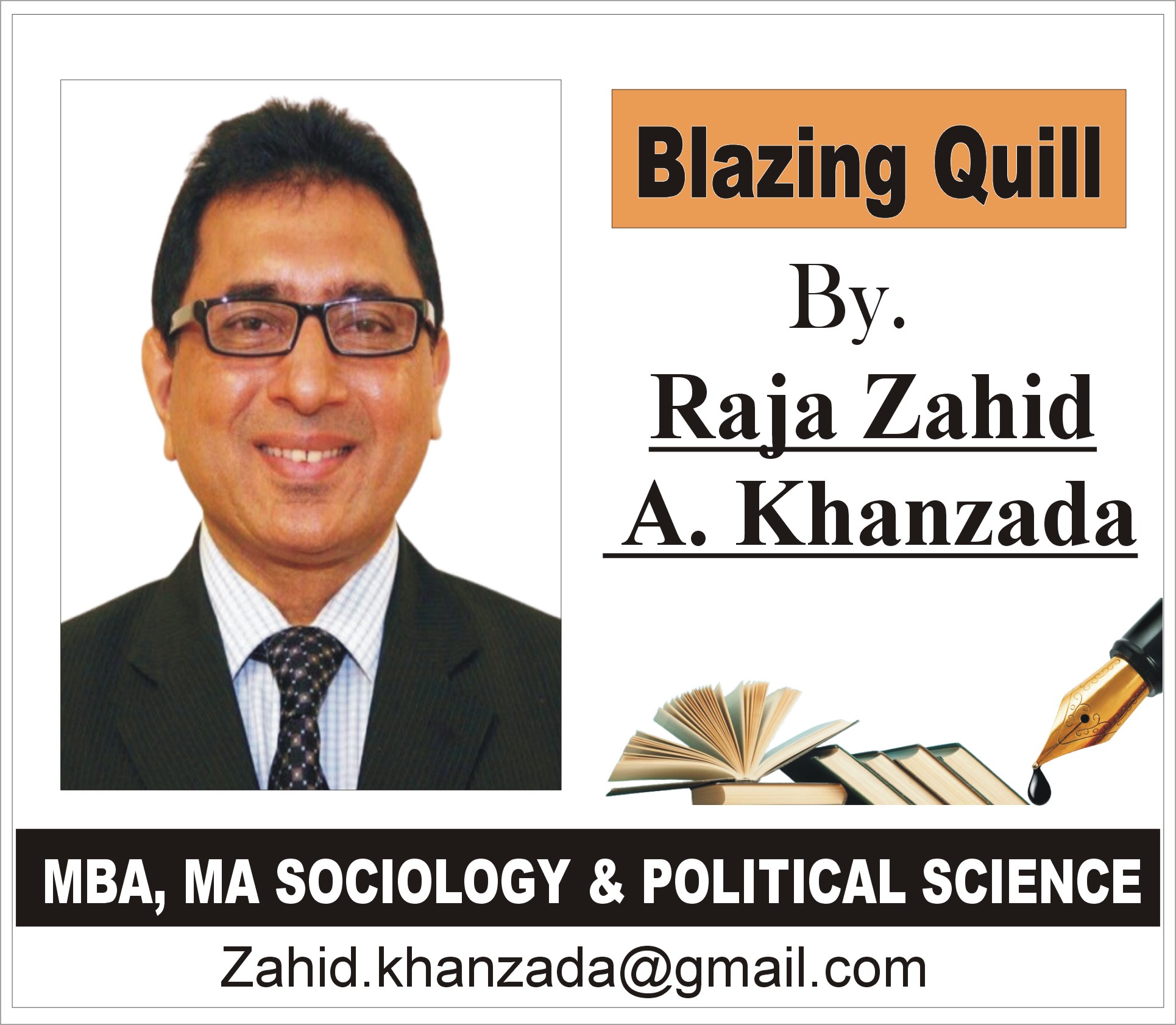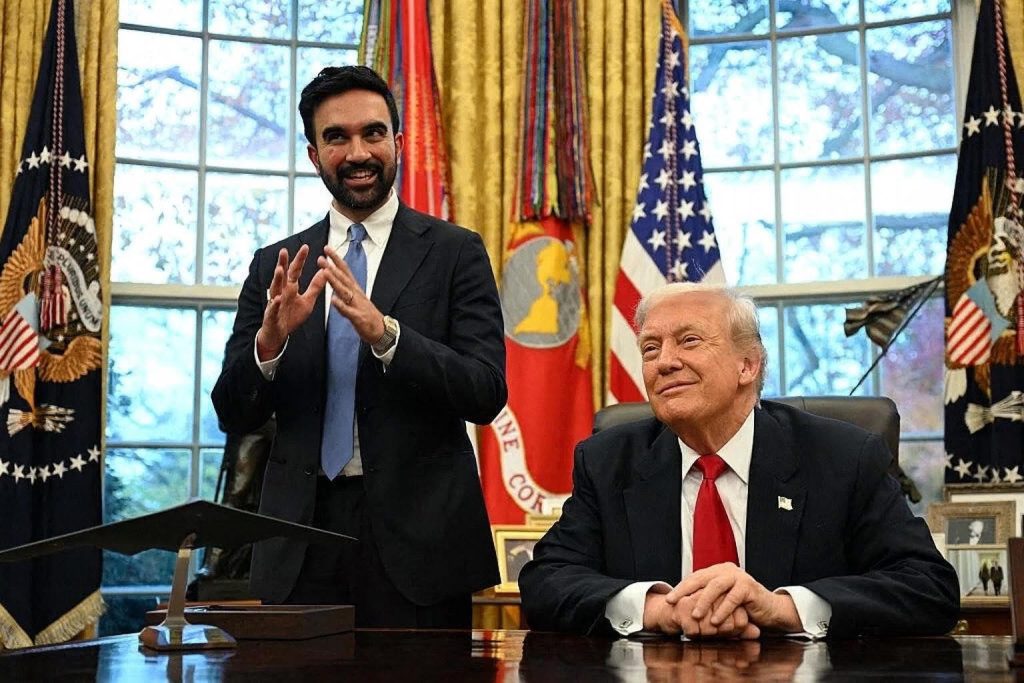Democracy’s Quiet Test: Mamdani’s Rise, Trump’s Shift, and Texas’s Politics of Fear
By: Raja Zahid Akhtar Khanzada
On a cold Washington afternoon, the lights inside the Oval Office glowed with an unusual stillness, as if history itself were quietly turning a fragile page. These were the same walls that had absorbed decades of whispers from capitalists, lobbyists and the old American establishment, yet today they had opened themselves to welcome a man whom these very forces once tried to keep outside their circle. But democracy has a way of breaking its own boundaries. Every so often, it elevates an unexpected name into a place where power is not inherited but earned. That name, on this particular day, was Zohran Mamdani. A Muslim, a Democrat and openly a Democratic Socialist, he entered New York politics without changing his name, softening his identity or distancing himself from his past. He arrived as he was, and with that same authenticity defeated wealthy donors, campaign machines and entrenched lobbies, the way a wandering dervish might whisper a simple truth inside a Pharaoh’s palace.
It was on a Friday that President Donald Trump and New York City’s newly elected mayor sat across from one another in the Oval Office. In a single framed moment, the weight of centuries of politics, contradictions, and ideological divides seemed to collapse into the quiet space between them. On one side was a president who had spent months calling Mamdani a socialist, a communist, even hinting that he ought to be deported. On the other side was Mamdani—the man who once described Trump’s politics as coercive and authoritarian, who promised publicly that he would make New York a “Trump-proof” city. Yet here they were, facing each other not as enemies but as two elected figures with a responsibility to a city of 8.5 million people.
It was a moment in which both men lost something and gained something. Trump shed the belligerence with which he once mocked Mamdani as “my little communist mayor,” the rhetoric of arrests and deportation that defined his campaign rallies. In its place emerged a president unexpectedly willing to say, “Some of his ideas are exactly like mine,” and “We agree on more than I ever imagined. The better he does, the happier I am.” Mamdani, for his part, set aside the sharpness of his earlier criticisms and found a path through which, despite profound philosophical differences, a shared future and shared priorities could still be shaped for millions of New Yorkers.
As the two addressed reporters, there was a subtle smile in their tone—an acknowledgment that politics, for all its ferocity, sometimes bends toward necessity. The President declared that the new center of American politics was “affordability”—rent, groceries, utilities, Con Edison rates. He conceded that Mamdani wanted more housing, lower rent and safer streets, and these were priorities he too could embrace. Gone was the bitterness of campaign language; in its place was the pragmatic admission that “If this city can excel under him, nothing would please me more. I don’t care about his party.”
This was the same president who only months earlier dismissed Mamdani’s worldview as Marxist idealism. Now he was saying, “Some conservatives might be surprised, but I believe he will do an excellent job.” When power encounters the verdict of voters, its tone often softens—not out of generosity but out of democratic obligation. These words were not merely political statements; they were subtle acknowledgments of democracy’s moral center.
Mamdani, too, leaned into the moment with clarity. When asked whether he still believed Trump to be an autocrat, he set aside confrontation and chose common ground. Both men, he said, remained committed to their ideologies, yet their meeting focused not on ideological combat but on the practical work of lifting the burdens on ordinary New Yorkers: rent, jobs, safety, the daily arithmetic of survival. When asked how he could still call himself a Democratic Socialist on the same day Congress passed a resolution condemning socialism, he answered with a quiet shrug—an implicit reminder that resolutions mattered far less than the lived struggles of people navigating rent hikes and grocery bills.
During the meeting, when asked about rising antisemitism, Mamdani spoke with striking conviction: that the safety of the Jewish community mattered deeply to him, and that he was committed to eliminating hatred across all five boroughs. A Muslim mayor, with socialist leanings, speaking inside the Oval Office about the protection of Jews, Muslims, immigrants and every community—that alone felt like an extraordinary snapshot in American political history.
Outside the Oval Office, political currents continued in their own rhythm: Mamdani’s meeting with Senator Chuck Schumer, his conversation with Governor Kathy Hochul, the House resolution on socialism, Speaker Mike Johnson’s jeer that “On the very day we condemn socialism, a Marxist mayor comes to the White House.” AOC’s statement that Mamdani was prepared to meet anyone who could help solve New York’s affordability crisis. All of this noise swirled, yet inside the Oval Office, quiet sentences carried heavier truths.
The truth that the man once called “my little communist mayor” had arrived with a stronger mandate than any insult. The truth that he had not trimmed his beard, softened his ideology or rebranded his name to fit the comfort of power. He came as a Democratic Socialist—and democracy forced the President of the United States to sit across from him, listen to him, negotiate with him and pose for photographs with him. In that moment, power did not rest with the state—it rested with the voters who had sent Mamdani there.
Widen the frame, and America appears split into two contrasting landscapes. There is New York, where a Muslim, the son of immigrants with African and South Asian roots, can become mayor through openness and conviction. And then there is Texas, where Islamophobia has long been a political instrument. It was there that Governor Greg Abbott, on the eve of election season, announced that travelers from New York should face a tariff—a blow aimed at the demographic diversity that defines New York, diversity rooted in Muslim, immigrant and minority communities.
Abbott soon escalated further. Through a sweeping proclamation, he labeled CAIR and other long-standing Muslim civil rights groups—organizations that had worked for thirty years on religious freedom, civil liberties and anti-discrimination—as “criminal” and “terror-linked.” With a few strokes of a pen, Muslims were painted as a threat, as if an entire community’s loyalty could be reduced to a checklist of suspicion. It wasn’t merely a proclamation; it was the beginning of systematic profiling. Lists began forming in quiet corners of agencies. Files took on new labels. And thousands of Muslim families, from Pakistan to Somalia to Palestine, felt the sudden cold of conditional belonging.
Texas is home to hundreds of thousands of Muslims—Pakistanis, Arabs, Africans, South Asians—running businesses, studying in universities, working in hospitals, building the tech industry, casting ballots and even winning elections. Two Muslim legislators now sit in the Texas State Assembly. This political awakening has unsettled certain centers of power, and that discomfort has fueled the Governor’s rhetoric. People pray in mosques, pay taxes and raise families, yet the narrative places them inside a narrow box of suspicion.
One America fears Muslims. Another invites a Muslim mayor into the Oval Office and listens as he speaks about safeguarding Jews and Muslims alike, about removing real criminals, about shared agendas of affordability, safety and justice. One hand clenches fear; the other extends toward dialogue and democratic cooperation. These two faces belong to the same nation.
This contrast should serve as a mirror for Pakistan. In Khyber Pakhtunkhwa, where the PTI-led provincial government navigates conflict with the center, security pressures and economic strain, there is much to learn from this scene in the Oval Office. If a president like Trump can sit beside someone he once labeled dangerous, irresponsible, socialist, even deportable—why can’t Pakistan’s establishment, chief ministers, opposition leaders and federal officials sit together without treating dialogue as defeat?
If New York’s mayor can say that he will support any agenda that benefits people and oppose any policy that harms them—without abandoning his ideological identity—then provincial leadership in Pakistan can learn that a mandate is not a weapon but an entry pass to the table.
Democracy progresses not by closing doors but by opening them. And yet in Pakistan, democracy is often treated like a funeral procession. After each election, it feels as though bridges have collapsed, and every door must now remain shut. But the Oval Office meeting showed that even the widest ideological divides can narrow when the intention is to improve the condition of a city, a province or a nation.
Mamdani’s rise carries a lesson for an entire generation. He did not change his name, did not conceal his Muslim identity, did not retreat from his ideology—yet the people of New York chose him as their mayor. In contrast, the politics of fear in Texas may create temporary noise, but history ultimately reserves its pages for those who stand firmly in their identity rather than those who weaponize the identities of others.
In the end, perhaps the entire narrative rests in a few simple truths: Trump lost a little of his ego and discovered a gentler face of democracy. Mamdani left behind some bitterness and found a broader door for his city. New York showed that the people’s mandate remains stronger than any power structure. Texas amplified Islamophobia and anti-Sharia rhetoric, but the same America was also writing another story—a story of Muslims knocking at the doors of power with their own names, their own faces, their own languages, their own beliefs.
And Pakistan—watching from afar—might finally understand that real power is not built through ordinances, weapons, amendments or manufactured narratives. Real power lies in the ballot of an ordinary citizen. History has always testified that those who run from their identity are erased, while those who stand in their truth and conviction eventually reshape the flow of history—sometimes in an Oval Office, sometimes in a presidential palace, sometimes on the floor of a national assembly




